Iran Doubles Pay For Conscripts Amid Crackdown On Popular Protests
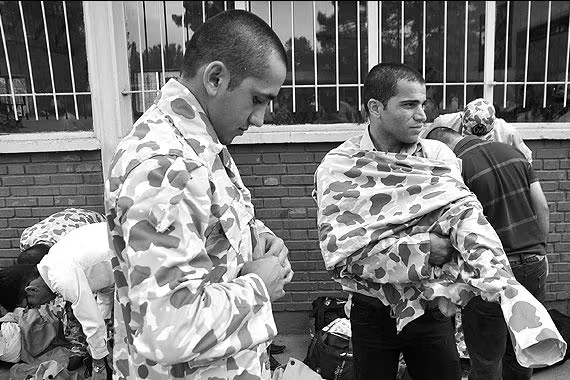
Iran has doubled the salaries of conscripts serving their compulsory military service, amid a huge jump in food prices and sporadic anti-government protests.

Iran has doubled the salaries of conscripts serving their compulsory military service, amid a huge jump in food prices and sporadic anti-government protests.
According to a report by Fars news agency, affiliated with Iran’s Revolutionary Guard, the average salary of the conscripts has increased about 115 to 145 percent compared with the previous Iranian year (ended on March 20) to over $100 per month.
According to unofficial data, the number of conscripts is about 400,000 to 500,000, a majority of which are drafted into the traditional Army, but some with the right connections serve with the Revolutionary Guard where conditions are much better. However, many serve in national police units, which is also used in suppressing protests.
According to Iran’s constitution, all men over 18 years of age must serve in the military for about two years otherwise they cannot apply for a passport to leave the country or conduct legal business.
In January, Iran announced it would reinstitute a buy-out scheme for the country’s compulsory military service, but canceled plans just one day after it was reported following widespread criticism by citizens and officials, who slammed the scheme as only benefitting rich families.
Rising prices have created a tense situation in the country, with heightened fears of nationwide protests breaking out at any moment. Videos published on social media in recent days show security forces being dispatched to restive regions.

Ultraconservatives appear to be completing the takeover of Iran's state television, also called the Islamic Republic of Iran Broadcasting Organization (IRIB).
The push to take over the country’s only broadcasting organization started in December 2021 with the appointment of Vahid Jalili as acting IRIB chief for cultural affairs and policy “evolution”.
IRIB operates under the supervision of Supreme Leader Ali Khamenei’s office, so the changes must have received his approval.
Vahid Jalili is the brother of Saeed Jalili, former chief nuclear negotiator, and ultraconservative Paydari Party’s presidential candidate in 2017. Saeed Jalili and IRIB chief Payman Jebelli were close colleagues at the Supreme Council of national Security in early 2010s.
It took Vahid Jalili only a few months to begin the “evolution” at IRIB. In early May, he chose ultraconservative Mohsen Barmahani as his deputy for TV operations. In less than one week, Barmahani, whose previous position was the head of the documentary department of Iran’s English-language rolling news channel Press TV, appointed new heads for six of IRIB’s key channels.
Like Barmahani himself, all the new channel chiefs are hardliners close to the Paydari Party. The Public Relations Office of the IRIB celebrated the appointments by publishing a poster that showed the pictures of Mohsen Barmahani and Meysam Moradi Binabaj who has been appointed as the chief of Channel 1, and the new managers of other channels.
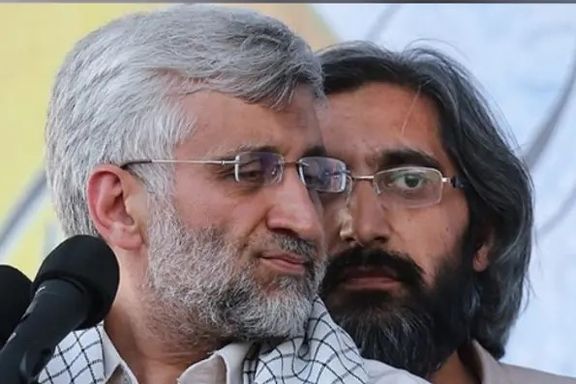
The chief of Channel 3, Ali Forughi has been re-instated in his post. Vahid Rahimian, an Iranian filmmaker, wrote in a Twitter post that all of the new directors belong to the ultraconservative Ammariun Group close to former nuclear negotiator Said Jalili and that all of them are members of the ultraconservative Paydari [Steadfastness] Party. Ammarium is also close to the cultural wing of the Revolutionary Guard, IRGC.
A report by Iran International earlier this year revealed that many IRGC intelligence officers were in charge of IRIB's news operations.
Reformist news website Ensaf News also confirmed that “nearly all of the newly appointed state television managers are close to Saeed Jalili,” but warned that “instead of heralding an ‘evolution,’ the appointments marked a resemblance to the managerial style of Channel 3 Chief Ali Foroughi,” who is a relative of Supreme Leader Ali Khamenei and is notorious for his despotic management and firing some of the popular TV personalities such as sports commentator Adel Ferdowsipour who were not quite obedient to him.
Ensaf News noted that the appointments were in contradiction to Jebelli’s promise of “Giving a voice to the voiceless,” when he was appointed as IRIB Chief in 2021. The Paydari and Saeed Jalili have no shortage of media outlets as they control nearly all the state-owned print media, the official news agency IRNA, as well as some of Iran’s key news websites including their mouthpiece Raja News.
The new managers have served in key positions at the Ammariun Film Festival and IRGC’s Owj Media Center which produces movies and TV series that propagate the hardliners’ ideological line of thought. One of the center’s well-known productions is the TV series Gando about the alleged infiltration of foreign elements and Iranian liberals in key organizations such as the foreign ministry.
The official news agency IRNA introduced the new managers as “young revolutionaries,” a characteristic first mentioned by Khamenei as the new generation that will steer the Islamic Republic in its second 40 years.
According to IRIB’s Young Journalists Club, the oldest one of the new managers was born in 1974, while the rest of them were born between 1981 and 1988.
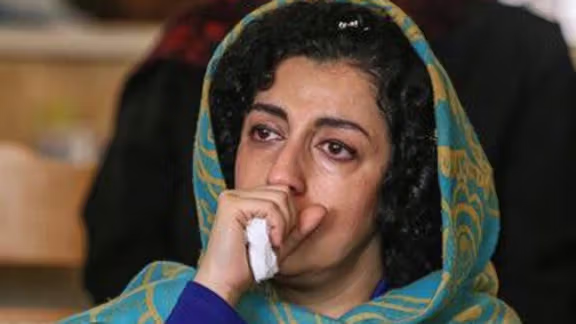
Imprisoned civil and human rights activist Narges Mohammadi has called on right organizations to put pressure on the Islamic Republic for its crackdown on popular protests.
Expressing support for the popular protests in the country on Friday, Mohammadi said that the international community should condemn the “killing of people on the streets” similar to the way they put pressure on Russia for its invasion of Ukraine.
In a message from prison obtained by Radio Farda, she described the Islamic Republic’s "violent" and "repressive" actions as worse than the "aggressor" governments such as Russia.
The activist also called on the people not to abandon the families of those killed and detained by continuing their protest rallies and “mass civil disobedience”, adding that protests are the legal right of the Iranian people.
The main cause of poverty and high prices in Iran is the "widespread systematic looting and corruption" by officials, she claimed, noting that the current miserable situation in the country is the outcome of an "authoritarian government".
Mohammadi was arrested last November, and she was sentenced to eight years in jail and 70 lashes, for trumped-up political charges in a five-minute trial in late January.
Protests began in Iran on May 6 as the government drastically raised food prices, leaving tens of millions of Iranians in danger of facing hunger as inflation surpassing 40 percent has depleted their means to buy basic food.
Several members of the US Congress as well as the State Department have voiced support for protesters, calling on the Biden administration for a more active response to the crackdown on the protests.

The Syrian Observatory for Human Rights says three people have been killed after Israeli strikes targeted Iranian bases and weapon depots on the outskirts of capital Damascus.
The war monitor said on Friday the Israeli surface-to-surface missiles were fired from the Golan heights and that the three killed were officers while four other members of the air defense crews were wounded.
According to the observatory, a fire broke out at one of the Iranian positions near the Damascus airport, where ambulances were seen rushing to the site of the strikes.
Syria's official news agency SANA quoted a military source as saying that the Syrian air defenses intercepted “hostile targets” as "The Israeli enemy carried out an aggression... that led to the death of three martyrs and some material losses".
The observatory claims the Friday strike follows one on May 13 that killed five people in central Syria, and another one near Damascus on April 27 which killed 10 combatants, among them six Syrian soldiers.
Last month, Israel allegedly carried out three strikes in Syria. In March, an Israeli attack over Damascus killed two officers of Iran’s Revolutionary Guard.
Israel’s military does not usually comment on specific strikes in Syria but has acknowledged that it has conducted hundreds of attacks against forces under Iranian command in Syria to prevent the Islamic Republic from accumulating weapons and entrenching itself further in the war-torn country.
Earlier in the month, The Moscow Times, an independent Dutch-based paper, reported that while Russia has begun pulling out its troops from Syria to bolster forces in Ukraine, Iran forces and Lebanese group Hezbollah have reportedly taken over its bases.
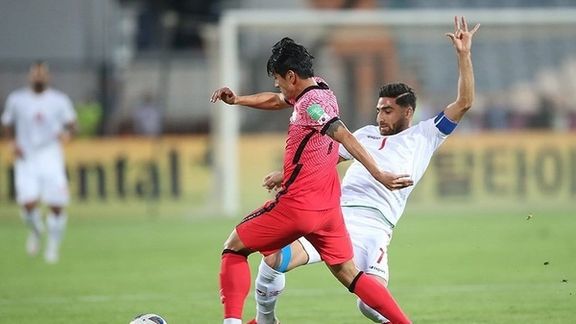
A football match next month in Vancouver between Iranian and Canadian teams has angered those who lost loved ones in Iran’s downing of an airliner in 2020.
Hamed Esmaeilion, the chief spokesperson for the Association of Families of Flight PS752 Victims, in his opinion piece for Canada’s Globe and Mail Tuesday said that that soccer in Iran is controlled by the Revolutionary Guards (IRGC) which is expected to send members to accompany the Iranian team to Canada for the exhibition game and said it is shocking that Canada Soccer is inviting the Iranian national team.
The invitation, he said, is a “slap in the face of everyone who has been affected by the January 8, 2020 downing of Ukraine International Airlines Flight PS752.” The invitation is also “ignorant of the security and safety of Canadians who have been frequently harassed by Iranian security agencies for years, including the families of victims,” he said.
Esmaeilion, a Canadian-Iranian citizen, lost his wife and daughter in the tragedy which claimed the lives of all 176 onboard. “There are many other opponents Canada Soccer can play instead, if they wanted to keep politics out of sports,” Esmaeilion, who has tirelessly campaigned against the Islamic Republic since the tragedy, said.
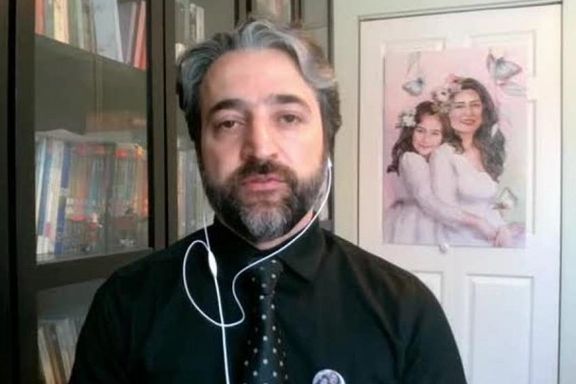
The airliner was shot down by two air-defense missiles fired by the IRGC, as it took off from Tehran’s Imam Khomeini International Airport. Only hours earlier, the IRGC had fired more than a dozen missiles at Iraqi bases hosting US and coalition troops in retaliation for the killing of the IRGC Qods Force Commander Ghasem Soleimani who was targeted and killed in Baghdad by a US drone strike just five days earlier.
Iran failed to explain the plane’s destruction for three days and subsequently attributed it to human error. Some of the families of those who died on the flight have contested the claim that human error was responsible.
Hamid Estili, the Iranian national soccer team’s manager, has told Tasnim news agency in Tehran that the Canadian side will be paying $400,000 to the Iranian Football Federation and cover the team’s expenses during their stay. According to Estili the Federation will only have to spend half of the sum paid by Canada Soccer and can save the rest.
Canada’s The Star has polled its readers about the event. The majority of around 13,000 voters to the poll (85%) by Friday said the invitation was an inexcusable decision.
When asked about the issue Tuesday, Canadian Prime Minister Justin Trudeau said this was a choice by Soccer Canada but added that he thought it wasn’t a good idea to invite the Iranian team. ‘But that's something that the organizers are going to have to explain.”
Following Trudeau’s remarks, Canada Soccer in a brief statement defended its decision, arguing that sports events can bring people from different backgrounds and political beliefs together.
Esmaeilion who is campaigning for the cancellation of the match argues that the Islamic Republic uses such events as a political tool to paint itself in a normal light and divert attention from the suppression of its citizens.
While many have supported Esmaeilion arguments on social media, others say sports and politics should not be mixed.
Abdolreza Davari, a hardliner politician, in a tweet Friday criticized those who object to the soccer match on political grounds and accused them of hypocrisy. “They are the same people who condemned Iran for refusing to compete with Israel at sports events and said sports should be non-political.’
Iran’s Supreme Leader Ali Khamenei has banned any games with Israeli athletes at international sports events.

Iran has rejected a Pakistani official’s claim that a man killed in a gun battle Wednesday and suspected of a recent bomb attack in Karachi was trained in Iran.
Iran’s embassy in Islamabad issued a statement Friday and dismissed allegations “made in public and in the media without providing any evidence, proof or documents to the government of the Islamic Republic of Iran through official means.” The statement called this “completely unprofessional and unacceptable.”
On Thursday, Syed Khurram Ali Shah, a senior official at the Counterterrorism Department in Sindh province, was quoted in a statement claiming that one of two militants – named as ‘Allah Dino’ – killed by Pakistani forces the previous day had been “taking instructions” from an Iranian commander named as Asghar Shah, “who operates his group from Iran, through phone calls, the video of which is available.”
Allah Dino, “an expert in making improvised explosive devices (IEDs)” had received his military training in Iran, the statement read.
At least one person was killed and several injured in the bombing May 12 in the Saddar quarter of Karachi. Responsibility was claimed by the little-known Sindhudesh Revolutionary Army (SRA), a group fighting for independence for the south-eastern Sindh. Iran and Pakistan have long traded accusations that the other harbors militants who launch attacks on the neighboring country.